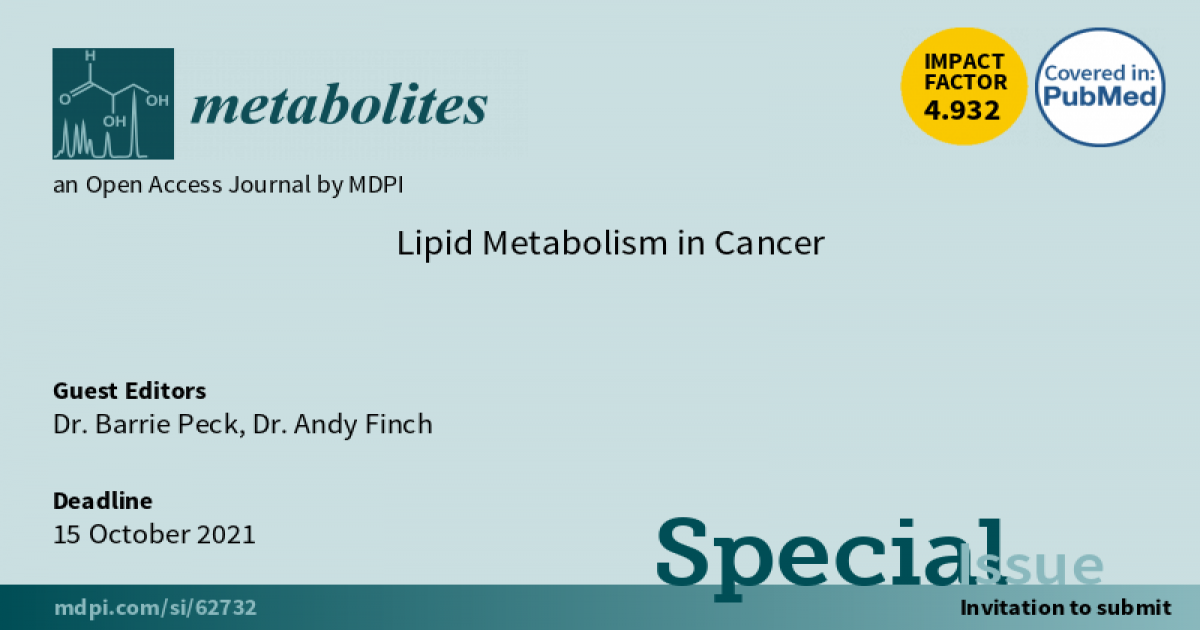- 3.7Impact Factor
- 6.9CiteScore
- 17 daysTime to First Decision
Lipid Metabolism in Cancer
Special Issue Information
Dear Colleagues,
Aberrant lipid metabolism has been identified in many human cancers and this raises the hope that the underlying metabolic enzymes may constitute novel and effective targets for cancer therapy. This Special Issue of Metabolites will focus on lipid metabolism in cancers and will include review and primary research articles on this topic. We invite the submission of manuscripts that tackle questions in biosynthesis, remodelling, uptake and oxidation of lipids, as well as lipid signalling, oxidative damage of lipids and lipid-protein interactions, both in cancer cells and other cell types within the tumour microenvironment. Many recent developments in the field of lipids and cancer have been enabled through the use of advanced technologies such as mass spectrometric profiling/measurement of lipids and high-content genetic and pharmacological screening. Therefore, manuscripts that address technological developments or perspectives in this area are also particularly welcomed. We hope to assemble a collection of interesting and thought-provoking articles that will inform future research directions and highlight the importance of lipid metabolism in cancers.
Dr. Barrie Peck
Dr. Andy Finch
Guest Editors
Manuscript Submission Information
Manuscripts should be submitted online at www.mdpi.com by registering and logging in to this website. Once you are registered, click here to go to the submission form. Manuscripts can be submitted until the deadline. All submissions that pass pre-check are peer-reviewed. Accepted papers will be published continuously in the journal (as soon as accepted) and will be listed together on the special issue website. Research articles, review articles as well as short communications are invited. For planned papers, a title and short abstract (about 250 words) can be sent to the Editorial Office for assessment.
Submitted manuscripts should not have been published previously, nor be under consideration for publication elsewhere (except conference proceedings papers). All manuscripts are thoroughly refereed through a single-blind peer-review process. A guide for authors and other relevant information for submission of manuscripts is available on the Instructions for Authors page. Metabolites is an international peer-reviewed open access monthly journal published by MDPI.
Please visit the Instructions for Authors page before submitting a manuscript. The Article Processing Charge (APC) for publication in this open access journal is 2700 CHF (Swiss Francs). Submitted papers should be well formatted and use good English. Authors may use MDPI's English editing service prior to publication or during author revisions.
Keywords
- lipids
- metabolic pathways
- biosynthesis
- signalling
- cancer therapy
- mass spectrometry
- lipidomics
- high content screening

Benefits of Publishing in a Special Issue
- Ease of navigation: Grouping papers by topic helps scholars navigate broad scope journals more efficiently.
- Greater discoverability: Special Issues support the reach and impact of scientific research. Articles in Special Issues are more discoverable and cited more frequently.
- Expansion of research network: Special Issues facilitate connections among authors, fostering scientific collaborations.
- External promotion: Articles in Special Issues are often promoted through the journal's social media, increasing their visibility.
- e-Book format: Special Issues with more than 10 articles can be published as dedicated e-books, ensuring wide and rapid dissemination.

